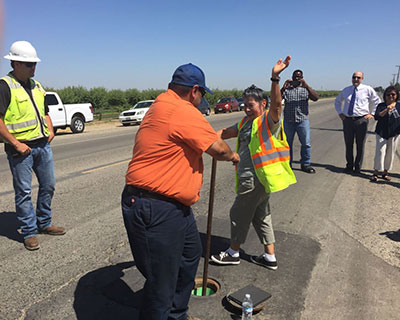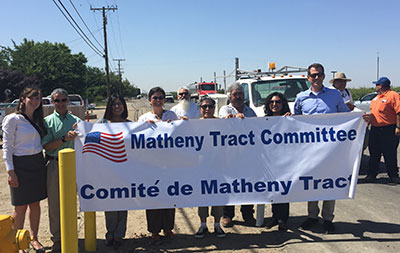By Elizabeth Zach, RCAC staff writer

For decades, Matheny Tract residents bathed in murky tap water that reeked of bleach. They worried about washing dishes in the water and wouldn’t even consider letting their children drink it. The water, warned public health officials, had arsenic levels too high for consumption.
Perhaps worse, options to get clean, safe water seemed few: Matheny Tract is a very low-income, unincorporated community of about 300 households two miles south of Tulare in California’s Central Valley. The region is over-pumped and parched amid the state’s drought, which is in its fifth year. As with many small water systems, Matheny doesn’t have enough ratepayers to afford ground and surface water treatment. They mostly rely on shallow wells, or buy bottled water for drinking and cooking.
But this summer, Matheny residents rejoiced as safe drinking water flowed from their faucets for the first time. It was a long road to get there, and one that ultimately led the small community toward wider recognition. In short, Matheny has become a test case for how small water systems can cooperate to bring safe water to disadvantaged neighborhoods.
While Matheny’s travails stretch back a few decades, it wasn’t until 2012 that a genuine solution started to come about. That year, the governor signed AB 685 which declared that all Californians have a right to “safe, clean, affordable and accessible water adequate for human consumption, cooking and sanitary purposes.” The following year the State Water Resources Control Board laid nearly $5 million worth of water lines as it prepared to consolidate Matheny Tract with the city of Tulare. State leaders also approved a $4.9 million grant to Pratt Mutual Water Company (Pratt MWC), which supplies water to Matheny, but had lacked enough rate payers to cover the necessary water treatment. But with an agreement finally in place, it was all systems go.
Then Tulare’s city leaders began to rethink the plan. In November 2014, they cited a structural hurdle—a well was discovered to have arsenic contamination, adding another layer of difficulty in supplying water to the parched area. They argued that there wasn’t enough water for their own needs, much less to share with Matheny’s residents. The drought also made it difficult to provide water to all users. Margee Fallert, Tulare’s deputy city manager, said that even fire hydrant reserves were running dry.
In June 2015, the governor’s trailer bill, SB 88, passed. The law allows the state to require cities to consolidate water systems; and it encourages larger municipalities to supply drinking water to nearby, more disadvantaged communities like Matheny. Coinciding with SB 88’s passage, Tulare filed a lawsuit to change its agreement with Matheny, essentially asking for more authority to inspect, repair and maintain the water system. Tulare’s suit also sought to allow the city to be the water supplier and limit Pratt MWC’s role to billing. The abrupt change prompted Pratt MWC to threaten a countersuit.

This legal jousting went on until last March, says Mike Carnes, RCAC’s loan officer, and not only exacerbated the rancor among everyone involved, but also added expense to the project.
“The state ended up funding additional studies and work to satisfy Tulare’s leaders,” he said.
Meanwhile, RCAC provided Pratt MWC with a $1.923 million revolving line of credit to allow the company to install a new water distribution system. This would correct long-standing water quality and pressure problems.
RCAC provided the loan with the understanding that, when the project was completed, Tulare would maintain the system and Pratt MWC would be disbanded. RCAC’s loan would eventually be repaid with California Department of Public Health (CDPH) grant funds. Funding from Proposition 84, which passed in 2006 and addresses safe drinking water, water quality supply and conservation, also supports the project.
Finally, earlier this year, the stalemate between the two communities came to a close when California’s Environmental Protection Agency required them to consolidate their water systems. By May, there was a resolution. By June 1, clean water was flowing from Matheny’s taps.
“In the end, the construction work all went well,” says Carnes, who managed the loan to support the project’s completion.
But it was a long haul. “All in all, the issue had been going on for 11 years,” says Jessi Snyder, community development specialist with Self-Help Enterprises (SHE), which assisted Matheny in the early planning to consolidate with Tulare. SHE encouraged Pratt MWC to apply for the RCAC loan, Snyder says, “because we’ve had a good partnership with RCAC, and we knew the loan would keep contractors happy about getting paid right away for their work.”
A group of Matheny Tract residents formed the Matheny Tract Committee, a community action group. For their work and persistence to finally connect the community to a safe water source, the California Environmental Justice Alliance presented them with the 2016 Environmental Justice Leadership Award.
Some residents, though, watched the proceedings drag on and seemed to lose interest or hope: Even with the consolidation agreement enacted in the spring, Snyder says, there were some Matheny residents who didn’t immediately follow through on cancelling their Pratt MWC contracts and signing on with Tulare.
“They were just unresponsive. That was a challenge,” she says. “So, I’d say now that the general feeling today is one of relief. Now that it’s over, we can all move on.”
But resident Elsa McKinney and her husband Vance were hopeful all along, and she says that the water she now sees coming out of her faucet “looks a whole lot different, and tastes a whole lot better.” Since moving to Matheny from Delano in 2002, she adds, she watched the community’s struggles to get clean water, and says that now that that day has arrived, they are especially pleased.
Matheny also has pursued other improvements, such as installing new water meters and fire hydrants.
And Matheny’s plight serves an even broader purpose. It spurred more legislation to deal with California’s ongoing drought, including the water bond measure that passed in 2014. It also spurred deeper investigation into problems like the ones Matheny experienced—California’s legislators recently allocated budget funds to create a data collection system that will track compliance issues related to the Human Right to Water.
